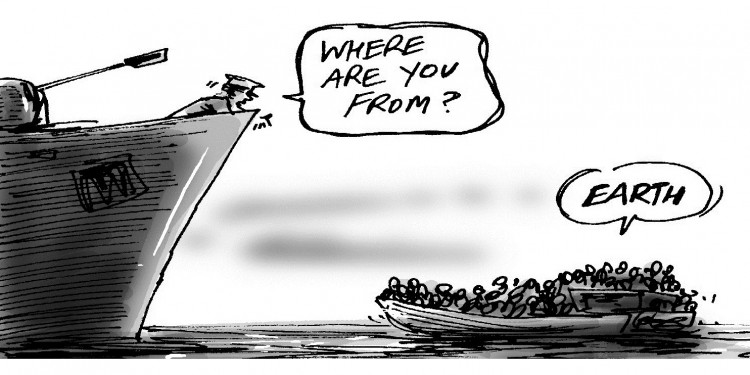Relief
That I have not slipped from my current dimension
That I have found my way back home:
a door to close
behind which I have rights
to heat and light
and clean, soft, silent space,
to privacy, authority, control over my own destiny,
a trade, an identity
I notice my community has structure
like a jigsaw
however ill-fitting a piece I feel at times,
I am a part of that,
held securely in its web.
All this is revealed to me in stark contrast
to the story of the People of Grande Synthe Refugee camp
who march doggedly through my sleeping and waking thoughts now,
hoods up, eyes down, shoulders hunched, hands in pockets,
ever trudging through the endless mud,
in search of anything, everything.
And in the chaos, shifting, sticking sands…
frustration at the waste of mindless distribution,
welcome to the west, we have too much of everything,
and here it is, disgorged from well-meaning vehicles,
and lying useless in the mud.
The inevitable natural order within the camp:
a few receiving much,
and many getting very little of use.
The harsh, cold winds destroying badly pitched tents
in ill-advised exposed spots.
I realise the years it took to learn to camp successfully in inclement conditions.
with people who speak Kurdish, but tolerate my broken Arabic,
I try to share my knowledge gleaned from parenting and performing at countless Glastonburys and circus grounds:
the cooker must go in the middle of the tent,
under the highest point of the roof –
away from the flammable nylon sides.
Best not smoke in the tent.
Pull the tent out tight to peg it down,
tighten and check the guy ropes daily,
don’t let the wind start flapping it, keep it tight and low.
Nothing must touch the sides of the tent when it’s raining.
Your tent will never stay up if you pitch it
on this rocky ground
on this windy corner…
They humour me,
polite and charming,
and mostly continue regardless,
with the same dogged determination and inner strength
that has brought them this far.
And I help, as best I can
and hold my tongue
(except about the fire risks!)
As volunteers in our high viz jackets,
we arrive in the morning,
shiny from our hot showers and warm beds,
willing and able.
As the day goes on, a tiny flavour of the reality of life at Grande Synthe trickles through…
we get separated from our friends,
some days we achieve nothing.
Coming back with precious items to distribute – the right shoes / clothing / camping gear,
we can’t find the people that we promised it to,
trudging all over site through the mud,
it rains
wet carpets / sleeping bags / clothes, so desperately needed
become useless gifts
there are no washing or drying facilities here,
so everything is de-valued to single use, creating a black hole of need that can never be filled.
The fierce, proud young men sort frantically through boxes of shoes and clothes to find the right labels,
heaps of discarded items piled useless in the mud.
New shoes and clothes are needed every day,
the pavement at the entrance to the camp littered withcast-off, muddy shoes and socks.
I met one enterprising French lady gathering a wheelbarrow load of muddy clothes from the ground, to take home to wash and dry, and re-distribute.
Feeling helpless, useless, under siege, and inadequate,
tiny victories spur me on.
A home created by a multi-languaged team pitching a large tent against the wind and rain,
friendships formed
mutual respect
the rich sound of children’s delighted laughter round the fire
as we walk away, having given out our activity / toy packs
seeing a child playing with the same hoop or ball I gave them yesterday
as yet still recognisable and intact despite the mud
connecting with the women,
who mostly hold back inside their tents,
so gracious, grateful, and pragmatic in their sorting of items offered
the smiles and delight on faces young and old,
fanning the flickering flame of hope in their eyes
as the zany, jazzy parade of Cirque sans Frontiers meanders through the mud on Sunday afternoon,
residents and volunteers dancing and leaping for joy in red noses
As the weather worsens,
structures which have not blown away become more elaborate and creative,
porches, canopies, chairs are added.
The volunteer-built wooden structures eventually go up,
after returning to the workshop for re-design
to comply with planning permission which allows them only two fixed sides, to avoid permanence.
As night falls on my last day
I resist the strong pull to remain submerged.
I walk away, back to my van.
Hot food is being served on Styrofoam plates from the back of a lorry.
People, mostly men at this hour, bustle on the ‘main drag’
Perpetual motion
in search of anything, everything.
Business continues as usual.
As I leave a piece of my heart in this magical world
dedicated to the strength of the human spirit
an accordion starts up in a nearby tent.
Kate Verney





